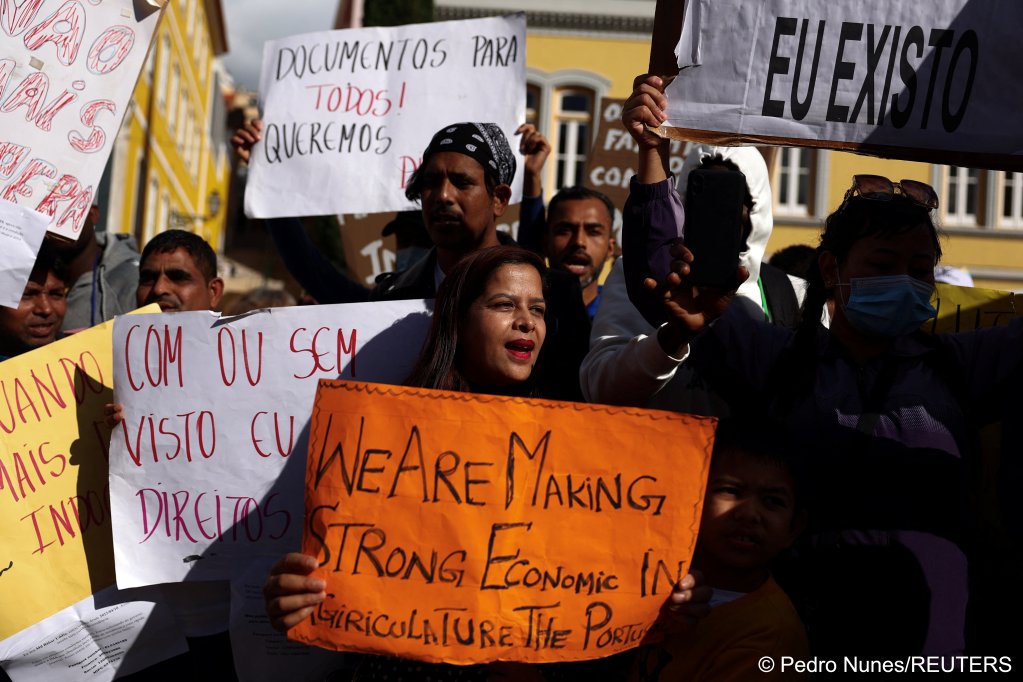Portuguese police have arrested 13 people accused of being involved in a bribery scheme that investigators believe illegally secured residence permits for over 10,000 migrants using fake labor contracts. The arrests come as the government ramps up immigration enforcement ahead of a national election.
Portuguese police say they have dismantled a large-scale immigration fraud network accused of illegally securing residency for over 10,000 foreigners in exchange for bribes averaging 15,000 euros per person, authorities announced Thursday (May 8).
The 13 individuals arrested include a lawyer, several business people, and an official from the foreign ministry. According to the Judicial Police, the group facilitated false labor contracts, which migrants then used to obtain residence permits, open bank accounts, and access public services in Portugal and across the European Union.
Many of them have since moved to other EU countries, police said.
Portugal to deport 18,000 migrants
The investigation has raised fresh concerns amid a broader immigration crackdown by Portugal’s center-right government, which recently pledged to deport 18,000 undocumented migrants in the coming months.
The undocumented migrants, according to government sources, are mainly from India, Pakistan, Bangladesh and Nepal. The notifications to leave Portugal will be part of an administrative measure with foreign citizens having 20 days to leave or appeal before the expulsion becomes mandatory. Those who fail to comply can be taken to court and possibly detained at hosting centers for the repatriation of undocumented migrants.

Authorities have not yet confirmed whether those who obtained documents through the scheme will be included in the upcoming deportations.
Read AlsoPortuguese government announces major migrant expulsion plan
Migrants used as political tool in elections?
Partly perhaps because of its colonial past, Portugal pursued more relaxed migration policies for migrants coming from Portuguese-speaking nations such as Brazil and several African countries (Angola, Cape Verde, Guinea-Bissau, Sao Tomé and Principe and Mozambique), many of whom have historically helped fuel the economic growth of the small European country, but as in many other countries in Europe, as economic hard times make the cost of living more difficult for many, immigration is increasingly becoming a politically divisive issue.
With a snap election scheduled for May 18, immigration is projected to be a dominant topic for voters. While the far-right Chega party has used migration as a campaign focus, its popularity has stalled in recent polls. Immigration though is also increasingly been a topic of Incumbent Prime Minister Luís Montenegro’s center-right Democratic Alliance's election campaign. His alliance is currently projected to win the most seats.

Prime Minister Luis Montenegro is "using immigration for the electoral campaign and, most of all, to ensure that the horrible performance of the government is not discussed," the opposition Socialist leader Pedro Nuno Santos stated.
Migrant support networks argue that many foreigners live in Portugal without legal status due to delays caused by the transition from the now-defunct Immigration and Borders Service (SEF) to the newly established Agency for Integration, Migration, and Asylum (AIMA), news agency ANSA reported.
The 2023 handover coincided with an increase in immigration, with Portugal's foreign population growing from 4 percent in 2017 to 15 percent in 2024, ANSA reported. The highest number of expulsions on record was in 2019, with around 4,800 orders issued.
With Reuters and ANSA
